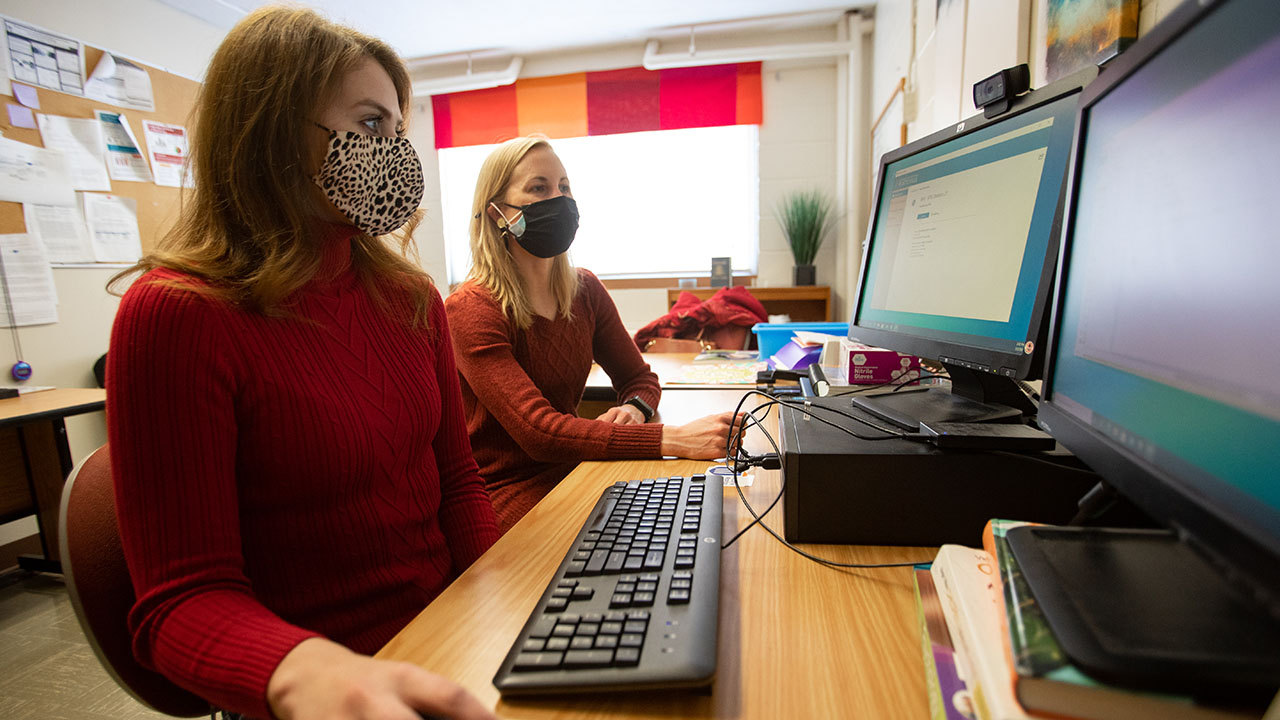
In the fall of 2019, Megan Bunyer, a University of Wisconsin-Platteville senior psychology major from Shannon, Illinois, began exploring potential research topics, guided by particular interests she had in emotion, memory and sense of control. When the pandemic hit last spring, it presented Bunyer with the opportunity to explore these interests in a much more timely and novel project, as she set out to examine the relationship between knowledge surrounding the Covid-19 outbreak and emotion and sense of control.
“Originally, we had in mind this concept related to flashbulb memory,” explained Dr. Kameko Halfmann, assistant professor of psychology, who advised Bunyer on the research. “If you think of a major event, like 9/11 for example, oftentimes people will have tunnel vision – a very specific, but very vivid memory of that event. When it came to COVID-19, we thought it was similar in the sense that it’s a very dramatic change in our life, but there is no one specific instance that would generate a flashbulb memory. So, we became interested in how our memory and knowledge of these events connect with emotions when it’s not so specific.”
Bunyer and Halfmann developed a study that focused on event memory, emotion and sense of control in relation to the social distancing measures of COVID-19. Using an online crowdsourced survey, they were able to collect data nationwide. They are considering collecting data from UW-Platteville students this spring, so they can compare them with national results.
“We assessed what participants remembered of events surrounding the pandemic social distancing measures, as well as the accuracy and confidence in memories of said events,” said Bunyer. “We also examined their present emotions and feelings of sense of control. Although we had initially intended to measure event memory, we determined the results were more representative of event ‘knowing.’ How well did participants pay attention to what was going on in the media or other sources and what did they pay attention to,” said Bunyer.
Preliminary results of their research suggest there is an association between an individual’s amount of knowledge surrounding an event and their emotions. Individuals who are more knowledgeable about the events that unfolded at the start of the pandemic are experiencing lower levels of both positive and negative emotions. Individuals with more knowledge also appear to feel more in control.
Bunyer has long had an interest in emotion and memory, especially as they relate to mental health.
“I feel that the most pressing needs of humankind originate from the lack of knowledge that exists in the fields of psychology and mental health,” explained Bunyer. “My personal interest in emotion, memory and sense of control stems from their role in various psychiatric disorders. Forming a better understanding of the relationship between emotion, memory and sense of control may provide valuable insight into understanding the mechanisms behind such disorders.”
Bunyer approached Halfmann about potential research opportunities.
“I had no background in research, only the drive to make it a part of my life,” said Bunyer. “I walked into Dr. Halfmann’s office a bit oblivious to the whole process and mustered up the courage to sit down opposite her and say, ‘I’m interested in research.’ This would start a conversation about my interests, her lab and our expectations; by the end, my nervous energy had dissipated. Throughout my time in her lab, she has offered me her insight and mentorship, while simultaneously fostering my autonomy. I deeply value learning about research in this balanced dynamic, and I am thankful that I have access to the knowledge of an expert in the field. I feel the opportunity to build these relationships is something that sets UW-Platteville apart from other universities.”
Halfmann, who collaborates with psychology students on research every year, agreed that UW-Platteville is unique in the research opportunities it offers students.
“UW-Platteville does a really excellent job of providing paid opportunities for students to do research,” Halfmann said. “At other small institutions I’ve worked at, if a student wants to do a summer research program, they would likely have to apply to work at another larger institution for the summer. We are able to get a lot more students involved in undergraduate research opportunities, and it is especially important for our students to get paid for these opportunities because so many of them have to balance work and school.”
Bunyer said she hopes to enter a master’s program in clinical or counseling psychology, with the intention of completing a doctoral program afterward.
“Graduate programs in clinical/counseling psychology are competitive, and undergraduate research experience looks good on an application,” said Bunyer. “Additionally, undergraduate research experience serves to cultivate and refine critical thinking skills that are essential to success in more advanced studies.”
Halfmann said even students who plan to enter careers after graduation, rather than graduate school, benefit from the transferrable skills of research, one of the most important being critical thinking.
“They learn to take in and evaluate a lot of different information, synthesize that information and develop something new and novel from that; they get to be creative with it,” she said.
Students also benefit from the reading and writing skills, along with analytical skills they gain from learning any new software.
“Any time a student can use a new tool or software, they are developing transferrable skills related to problem solving and troubleshooting,” said Halfmann. “In a world like we have today with constant new technology, being able to troubleshoot is an incredibly useful skill to gain, alongside actually analyzing data, interpreting numerical information, and reading and producing graphs. It’s a great chance for students to dive into one specific problem or project and see that from start to finish, instead of little glimpses they would get in a classroom setting.”